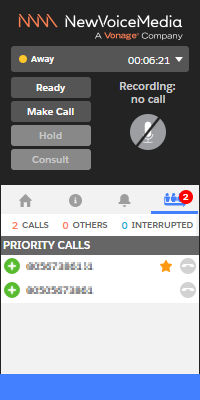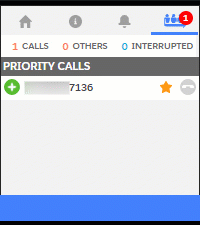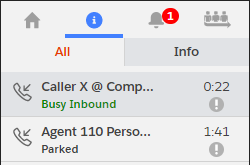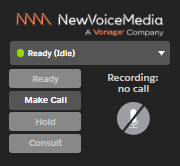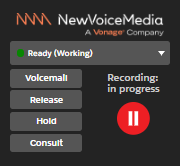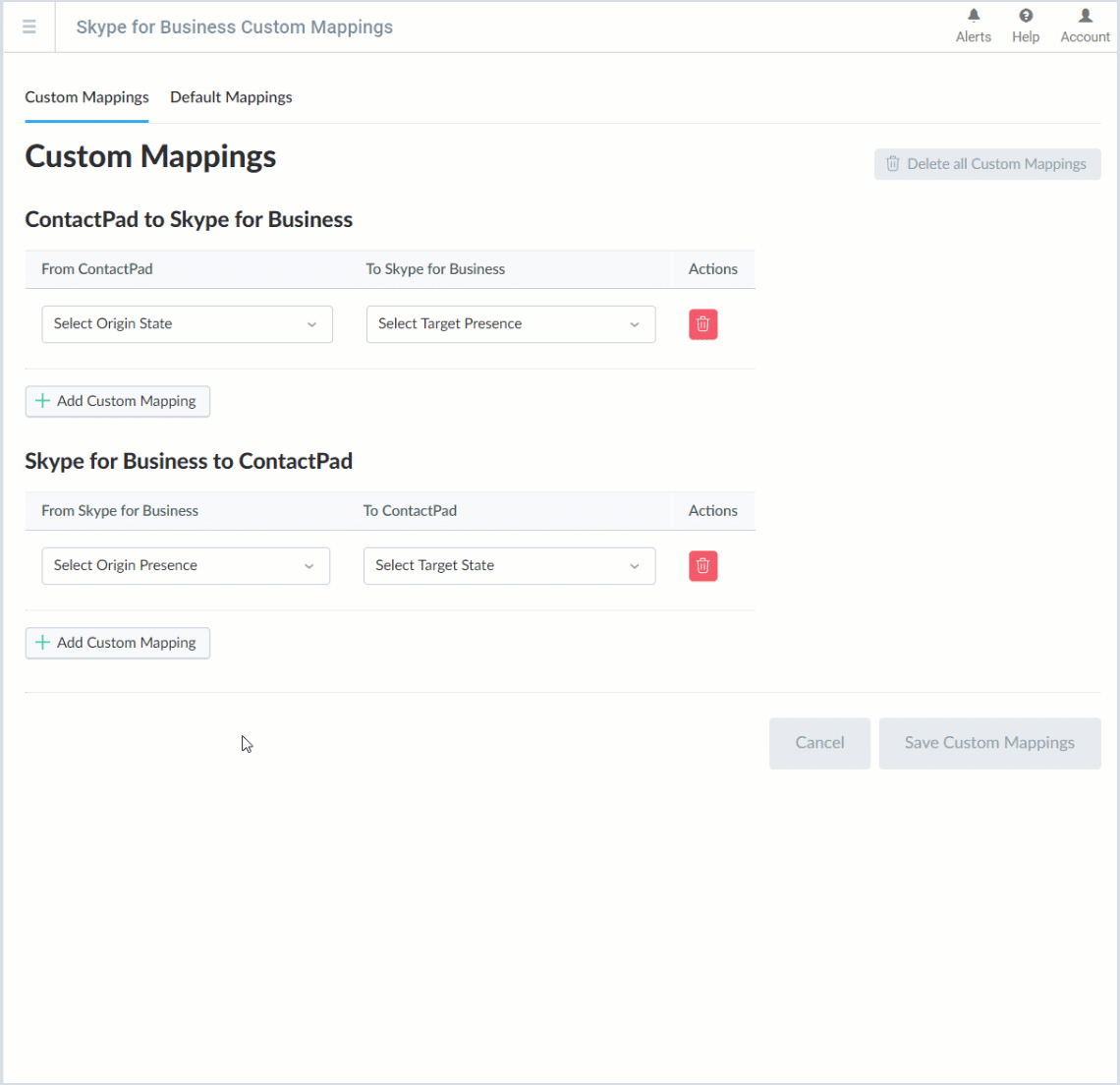Winter '20 Release
This Winter released the following features:
General Availability Features
Insights Stats API and Dashboard enhancements for omni-channel
Insights Stats API
Since Winter '20, the Insights Stats API provides data about non-call interactions (emails, SMS, chat, and so on). Such data includes interrupt, park, and abandon events.
For the latest documentation of Insights Stats API, see NewVoiceMedia Insights Stats API.
Dashboards
The Dashboards feature uses the Insights Stats API to retrieve information about both call and non-call interactions. The additional data provided by the API is now viewable in Dashboards. This data gives you more insight into non-call interactions.
For information about viewing dashboards, see Using Real-time Analytics.
Priority call handling
Priority call handling includes the following features:
Priority call configuration
Previously, 'priority calls' were only calls that NewVoiceMedia delivers to an agent's personal queue; such calls are only a priority for the intended agent. Since Winter '20, administrators can also configure priority calls based on the skills required to handle them. These calls appear in priority calls lists in eligible agents' ContactPads.
For information about priority call configuration, see Configuring virtual queues.
Call parking
With priority call handling, an agent is able to park an existing call to receive a priority call. Parking the call does not end the call; instead, parking puts the call on hold while the agent receives the priority call. The agent is able to return to the original call and then alternate between the two as required.
For information about call parking, see Parking a call.
Interaction claiming
Since Winter '20, if enabled for your account, an agent eligible to receive a priority call can temporarily claim that call. Claiming a call removes it from all other eligible agents' priority call lists and reserves the call for the agent. Claiming prevents multiple eligible agents from ending their current calls to receive a call that only one agent will receive; it also prevents an agent from receiving a non-priority call that has been waiting longer than the priority call.
For information about call parking, see Claiming a call.
Contextualized notifications and ContactPad call data
By default, when a call is routed to an agent, the caller's CLID appears in the agent's ContactPad and in call notifications for priority calls. Now, administrators are able to override the details in both ContactPad and priority call notifications. Instead of seeing a caller's CLID, agents can view details about the caller such as their name, account, or account renewal date. Along with the customized data, agents are able to see up to five queuing priority calls in the priority calls list.
For information about contextualization notifications and ContactPad data, see Setting a display name for an inbound interaction.
Call notifications
Previously, agents received priority call notifications when NewVoiceMedia routed calls to the agents' personal queues. Since Winter '20, agents receive priority call notifications for any priority call that they are eligible to receive.
For information about call notifications, see Call notifications in ContactPad.
ContactPad presence
By default, ContactPad displays an agent's state in the state bar. The agent can manually change their state at any time—available states vary depending on their current activity and on what other features are enabled for their account. The agent's state can also change automatically, also depending on their current activity.
Since Winter '20, if the ContactPad presence feature is enabled for your account, ContactPad displays additional information in the state bar. This additional information gives more insight into whether the agent is available to work on interactions.
For information about ContactPad presence, see ContactPad with presence.
Support for OpenID
Previously, users could log in to the NewVoiceMedia platform using single sign-on through Salesforce, Microsoft, Vonage, or a combination. Users logged in to the NewVoiceMedia platform by logging in first to their linked Salesforce, Microsoft, or Vonage account. Since Winter '20, administrators can also configure single sign-on for external identity providers. Applicable external identify providers must support OpenID Connect (OIDC). When configured, users are able to log in through that external provider as well as previously available providers.
For information about configuring single sign-on for an external provider, see Configuring single sign-on.
Skype for Business: presence integration
Since Winter '20, the Skype for Business feature is generally available. Enabling the feature synchronizes an agent's state in ContactPad and presence in Skype for Business.
With default state and presence mappings, if an agent's presence in Skype for Business changes to Busy (either manually or automatically), NewVoiceMedia changes the agent's state in ContactPad to Extended Away. In this scenario, NewVoiceMedia will not route interactions to the agent. If an agent clicks to make a call in ContactPad, which automatically changes their state in ContactPad to Ready (Offline), the agent's presence in Skype for Business changes to Do not disturb. In the latest version of the feature, administrators can configure custom state and presence mappings.
For information about Skype for Business integration, see Integration with Skype for Business.
Queued callback configurable CLID
Setting up a callback enables the caller to hang up their phone rather than waiting for an agent to answer their existing call. When an appropriate agent becomes available, NewVoiceMedia makes an outbound call from that agent to the caller. By default, NewVoiceMedia makes the callback to the original CLID.
Since Winter '20, administrators can override the number that NewVoiceMedia should use for each callback.
For information about overriding the number for queued callbacks, see Setting up queued callbacks.
Transcription Enhancements
Transcription improvements through changes to the transcription engine. Global English has now been introduced across all regions. This means an American can speak to an Australian in English and the transcription will be equally good for each party even though they are speaking a different flavour of English. Compared to having a transcription engine for a specific English accent, this Global English model helps to improve the transcription when speaking to non-Native English speakers in an English speaking contact center.)
Pilot
IVR payments
The IVR Payments product is a new pilot feature that extends our PCI Pal Agent Assist Secure Payment feature. Customers who need to take automated payments over the phone can add IVR Payments to their PCI Pal service. The IVR Payment service uses the IVR Data Connector applet to get cardholder data. The secure PCI Pal IVR service then collects the sensitive credit card information. This data is then transmitted to your merchant Payment Service Provider for processing. A second IVR Data Collector applet writes response data into a backend system.
Frankfurt Voice Point of Presence (PoP)
This feature provides a local telephony presence for NewVoiceMedia customers in mainland Europe. This local presence improves call quality to Eastern and Southern Europe, and Russia.
ContactPad with Screen Lock for NewVoiceMedia extension
The Screen Lock for NewVoiceMedia extension can update an agent's state whenever their computer locks—either manually by the agent or automatically due to inactivity.
By default, with or without the Screen Lock for NewVoiceMedia extension, when an agent's computer locks, the agent's state in ContactPad remains unchanged. NewVoiceMedia will continue to deliver interactions based on the agent's ContactPad state. If the agent was available to handle interactions before their computer locks, NewVoiceMedia may deliver interactions that the agent is not able to handle while their computer is locked.
Using the Screen Lock for NewVoiceMedia extension, an agent can ensure that their state is updated whenever their computer locks. The agent can choose from Away, Extended Away or Log Out states, plus any minor states within these major states. Changing the agent's state to one of these states will prevent NewVoiceMedia from delivering interactions that the agent is unable to handle because their computer is locked.
For general assistance, please contact Customer Support.
For help using this documentation, please send an email to docs_feedback@vonage.com. We're happy to hear from you. Your contribution helps everyone at Vonage! Please include the name of the page in your email.
